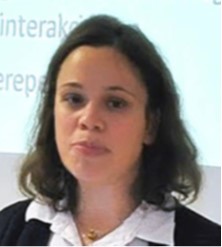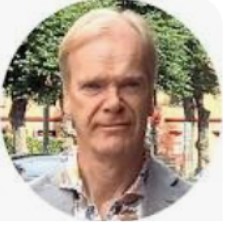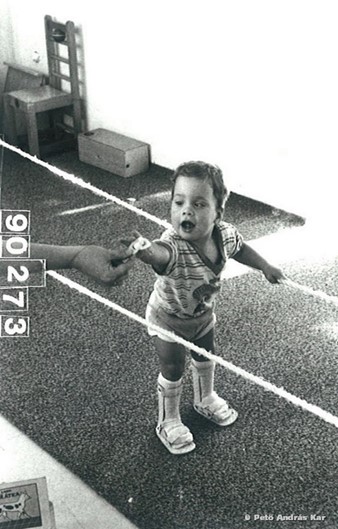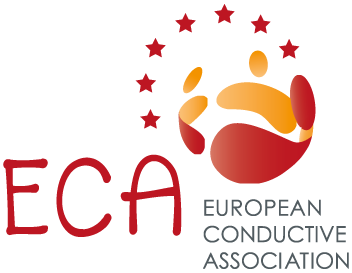Communication & Networking
Promotion of Conductive Education
Since the 1950ies there are thousands of disabled people who profited from Conductive Education. Many of them learned abilities they did not have before and increased their possibility of a self-determined life by living a ´Conductive Lifestyle´.
ECA has nominated Adrienn Oravecz and Lars Mullback, two ECA advisory board representatives, to promote Conductive Education for ECA. They both live and work with Cerebral Palsy.
Read what they have to say about Conductive Education, join them in our forum and tell your own story!
We are Conductive Education Fans!
Adrien Oravecz, Hungary
Researcher, English Teacher
“The Petö method helped not only my life, but alsy my familiy’s life,
I could even reach my doctoral level!”

Lars Mullback, Sweden
Film producer, journalist, author, Honorary Conductor
“Conductive Education is so important for us to be able to coop with our lives!”

Call for people who benefit from Conductive Education
ECA is an organization for professionals, working for official recognition of Conductive Education.
This is fantastic and important especially for us, who like Conductive Education with Cerebral Palsy and for our families.
We, Adrienn Oravecz and Lars Mullback, living with Cerebral Palsy. We think this work by ECA could be more efficient if we, who benefit from Conductive Education, supported it by telling our stories and explaining why Conductive Education is so important for us, to be able to coop with our lives.
What do you think about Conductive Education and about your disability?
We started this project here on the ECA website and installed a forum on the ECA partner homepage ConductMe, where you can tell your own story. If you send in your story we check with you, if we can publish it. If you want to write some more short- or comment posts already made, you can write directly in the Forum under the topic ”My story”.
“My Story” – How can you share your story
A little guideline to help to make Your ”My story” in order to share your experience:
What can you do to support Conductive Education?
Write or film your story by answering these questions:
1. What does Conductive Education mean to you?
2. What is unique about having cerebral palsy?
3. How could we with a disability, who participate in this forum, help and support each other?
4. What is important to you, to make your life easier?
Hope to hear from you here:
https://learn.conductme.com/forum/we_are_conductive_education_fans_/
Adrienn´s and Lars` story
Adriens’ Story – We can build a bridge for a more inclusive society!
Introduction: Dear All, My name is Adrienn Oravecz I am 33 years old. I am an English and Hungarian for foreigners teacher and pedagogical researcher. At the beginning, I was present in the life of the conductive community as former student, and nowadays as a young researcher of conductive pedagogy and social integration of people living with cerebral palsy. Early recognition and educating parents are key in conductive education. I was lucky, because my parents quickly realized that my movement was not developing like that of my healthy twin. As a result of giving birth to twins, I was deprived of oxygen and was diagnosed with spastic cerebral paresis. The increased muscle stiffness affects all my four limbs, but especially my legs. I can walk with two crutches. Before starting the mother- child group in the Pető Andreás Faculty of Semmelweis University, Hungary I was not able to do the very basic movements such as lifting my head up or turning from back to stomach.


Conductive Education: My mother quickly found the Pető method, where she was taught the care tasks in the mothers’ group, and I was instructed the basic movements that start spontaneously in the case of healthy developing babies. The well-planned conductive agenda required practicing at home, and as a result, my development started. I returned to CE to the after-care service in my first year of elementary school until I was eighteen. When I was 12 years old, I had a bilateral hip operation, after which I went back to rehabilitation every day and thanks to my amazing conductor, I could regain my pre-surgery shape soon. When I had to choose again from varied rehabilitation options, I decided in favour of conductive pedagogy again, because I believe in the effectiveness of the method.
At that time, I went to rehabilitation every day therefore I could not attend to school lessons. I truly appreciated the daily conductive pedagogic sessions, so I did not miss school at all, because I did not really have friends there. I enjoyed going to the Pető Faculty because I found friends among my peers. The sessions positively strengthened my self-confidence, thanks to which I was able to perform well in the mainstream school. I also coped better with the daily school challenges. My conductor just like my parents always believed in me. She could find the right techniques and encouraging words to motivate me to reach my daily goal. The rehabilitation after the hip operation was the most difficult period of my life because I had to start re-learning basic movements such as squat and walking stably with crutches. At the same time it was also the most beautiful, because the progress was visible day by day.
The Pető method helped not only my life, but also my family’s life. My parents raised me in accordance with the basic principles of conductive education and supported me, because the main pillar of the method is that it teaches children to learn. I managed to develop this learning ability so effectively that I could reach the doctoral level.
I am currently a doctoral candidate at the Doctoral School of Education at Eszterházy Károly University Eger, Hungary and waiting for my final defence. As a researcher, the world opened up to me owing to conductive education. I was able to participate as a speaker at the 9th and 10th World Congress on Conductive Education. As a result of these World Congress presentations I was invited to Germany and Sweden where I could observe daily CE programs there.
World Cerebral Palsy Day: I learned about World Cerebral Palsy Day due to my doctoral research. Ever since I have known this influential day exists, I have actively participated in it every year. For example, in April of 2018, as a Coordinator of the Equality Working Group I lead a workshop in Tampere, Finland about Cerebral Palsy on the Annual General Meeting of European Council of Doctoral Candidates and Junior Researchers (EURODOC). Then in August I gave sensitizing and informative lecture on Cerebral Palsy and CP World Day for doctoral students at the Association of Hungarian PhD and DLA Candidates (DOSZ) Summer Camp in Debrecen, Hungary. In October I was invited to Forray High School and Art High School to give a presentation to high-school students. This activist role is crucial to me, because through my own example I want to raise a generation that is more accepting of people with disabilities. I also consider it significant to shape the attitudes of my teaching colleagues, which is why I am happy when I am invited to give a lecture in schools within the framework of a class teacher’s lesson.
My massage to people with physical disability: In my opinion learning and self-education very important, because knowledge gives self-confidence. In my view language learning is even more important for people with disabilities, because languages can open up the world to them. Even if you are physically unable to go to a specific country due to your condition, you can gain knowledge about the country’s culture and customs through knowledge of a foreign language. I would like to encourage you my dear peers with disability to learn languages because with the help of languages and the power of words, we can build a bridge for a more inclusive society by getting to know each other.
Adrienn Oracecz

Lars’ Story – We need each other!
Intelligent and with severe disability, that’s me. Am I alone in the world? I really don’t think so. But where are the places for us to meet? Do we need a meeting place? Do we need each other?
I’m 61 years old, highly educated, have worked all my life, have been married for 24 years, and have a daughter and severe cerebral palsy. When I was young, I thought it was very important to live in the mainstream world, to compete for education, work and love in the same way, as everybody. I was even afraid to be seen among other disabled. I was afraid to be seen as a needing person, instead of a contributing part of our community.
Maybe it was good for me as a person, for my career, but I doubt it was good for the disabled in general, as a community.
Now I finally met Adrienn Oravecz, another person with a disability and intellectual capacity. She is an academic researcher of conductive pedagogy and social integration. We both realize that people with cerebral palsy all around the world need each other, for support and to help each other to make our common voices heard.
Having physical injury is seldom just not a physical limitation. The visible and functional problems are often misinterpreted as intellectual disorders. It looks like we think poorly, just because we slur our speech and have difficulty consciously controlling our muscles.
This leads to the fact that we with Cerebral palsy or other disabilities have difficulty getting our voices heard, so we let others speak for us.
It’s time to speak for ourselves.
In Sweden, we came together, many persons who benefit from Conductive Education . We told politicians our needs. We spoke so clearly and for such a long time so we succeeded in changing the health care and education system in Sweden. Therefore Conductive Education now has become a part of the Swedish welfare system for people with cerebral palsy. Together the future lies ahead. We are sure there are many problems and dreams we share. Maybe, if you write about your thoughts here, you can find more people with the same ideas and we could work together to make them come true.
What are your dreams, for yourself, and for people with cerebral palsy as a community?
Let’s share our experiences.
Lars Mullback
